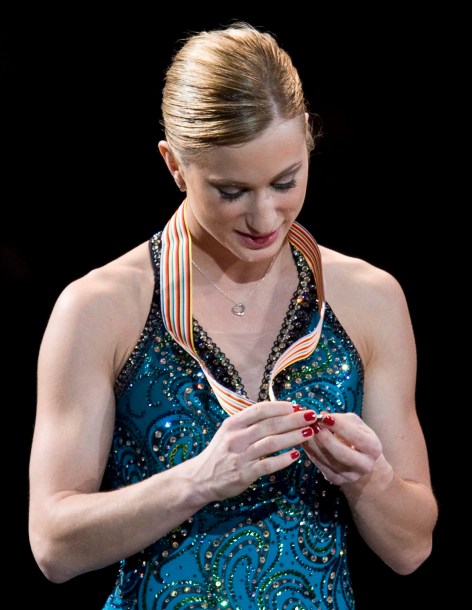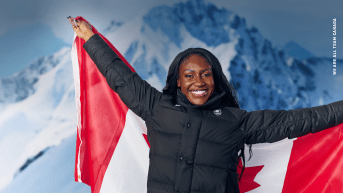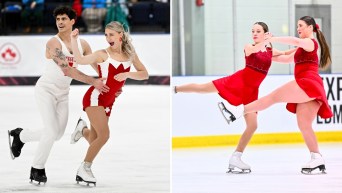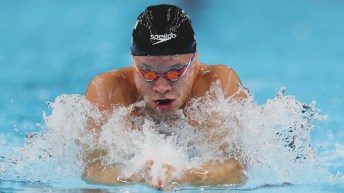Joannie Rochette: “I think I’ve always had this spark”
Joannie Rochette is Canada’s premier women’s singles figure skater. In 2006, she reached her first Olympic Winter Games and finished a strong fifth. Since then she has been on an upward trajectory. Highlights of this past season include a silver at February’s ISU Four Continents Championship in Vancouver, followed in March by a World Championship silver medal in Los Angeles. Not since Elizabeth Manley in 1988 has a Canadian woman won a singles medal at the World Championships.
Rochette reminisces on how she got here in this Q&A.
Where did your career in figure skating begin, at the very beginning?
I come from a very small town called Ile Dupas. I started to skate in a city nearby, Berthierville. My father was a hockey coach and my mom would take me to watch him coach. Every time I wanted to get on the ice, he would just take me on his arm and give me the feel of the ice. That’s how I got started. And I was an only child and my mom wanted me to meet other kids, so she brought me to skating.
How natural did figure skating come to you? Was it something you really had to work at?
I think I’ve always had this spark. I was always very energetic, always wanted to get better and skate faster. I already had that drive. I don’t think I was naturally good at it, because I was very, very inflexible. I was a tomboy.
How did you manage the pressure of your first Olympic experience in Turin?
I was far away from home and actually I felt less nervous than in other competitions. I was doing my normal training, went to watch a hockey game, and I was just enjoying myself there. I was there for the Opening Ceremony until the Closing Ceremony. It’s good that my mind was open to everything and I was feeling like I was having the time of my life. For Vancouver I may have to plan differently, but we’ll see as it comes closer.
What do you think of when you think of 2010?
I try not to think too much about it every day. I know it’s coming. I’m taking it one competition at a time. I’m looking forward to the experience, getting the clothing, going to the Opening Ceremony, meeting new people. I try to think of all this and not about the pressure. It’s different for each athlete; you do what’s best for you.
Now 23 years old, what are the lessons you’ve learned while slowly becoming a high performance figure skater?
You never know what life will bring you and how much to expect from yourself. Honestly, when I was 14 years old, I never thought I would get where I am right now. It seems that every step I took led to bigger things, and it’s amazing to see. I’m so excited about my career so far. In figure skating, in other countries, the girls can do their triples sometimes by 12 years old. For me, at 12 years old, I couldn’t do a triple jump. I did not think I could improve that quickly when I changed coaches. I’m so thankful for that.
Did Jeff Buttle’s retirement come as a surprise – and what does it mean for the team?
It wasn’t a surprise, because after the Olympics, he already felt he had achieved something big in his life. He had a world medal, an Olympic medal and when he won the World Championships, it wouldn’t have surprised me if he retired, but in the summer he started training and made new programs, but then he changed his mind. To have a career like his, he may have felt on top of the world, and I probably would have done the same thing.
It is a big loss for us, but for him he’s very happy doing shows and moving on with his life. I think we have other great talents in Canada right now. It’s their time to shine and they have to take the leap.
As a figure skater, do you consider yourself a performer or an athlete?
It’s very hard to say. When it comes to competition, I tend to be more of an athlete. When it comes to shows, I am more of a performer. I have tried this year to be more of a performer, to be more loose.
When skating, is it fluid, flowing motion, or is your mind thinking of the technical fine points?
I cannot think before I jump or else I will miss it. I need to turn my brain off and go for it. It’s a sport of muscle memory – you need to do lots of repetition at home and training so your body gets so used to it that you don’t even have to think. The movements are so quick, it’s not even a second, and there is no time to think.
Eight for Eight with Joannie Rochette
• Favourite figure skating move: Triple toe jump
• Favourite music to skate to: Rock songs for shows, classical for competitions
• Ideal Friday night: Out with friends, dancing
• Can’t travel without: My hair straightener (but it always breaks when I go overseas)
• Biggest source of inspiration: To see how far I can go
• Favourite cuisine: French
• If you weren’t figure skating, you’d be: In gymnastics (but I wouldn’t have been flexible enough)
• If you played Patrick Chan in ice hockey, who would win: I think he would let me win (laughing)




